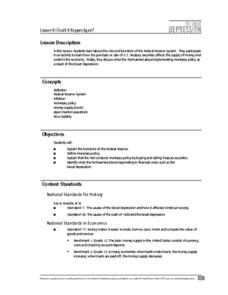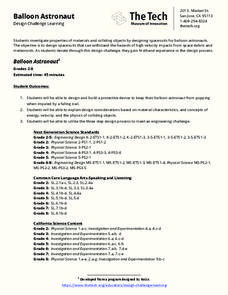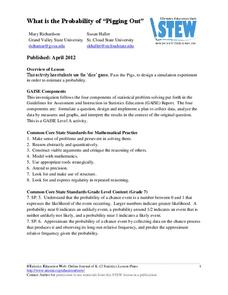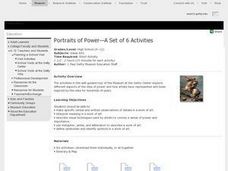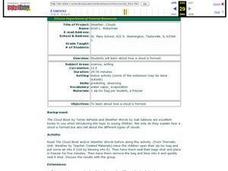Curated OER
Trailers Become Schools After Hurricane Katrina
Students share their thoughts about natural disasters, then read a news article about how life at an elementary school was changed after Hurricane Katrina. In this current events lesson plan, the teacher introduces the article with a...
Federal Reserve Bank
Could It Happen Again?
The final lesson in a series of six about the Great Depression focuses on the Federal Reserve's role in stabilizing the economy.
Federal Reserve Bank
Turn Your Radio On
After listening to and analyzing a series of FDR's Fireside Chats, groups create their own recordings, and using New Deal programs, address a current economic condition.
Federal Reserve Bank
What Really Caused the Great Depression?
Falling wages. Rising unemployment. Falling prices. Sound familiar? Young economists look at the role the US banking system had in causing the Great Depression.
Curated OER
Measurement and Conversion of Units in a Recipe
In a cross-curricular measurement and literacy lesson, your class will identify and compare cooking measurement instruments. They read a recipe and sequence a set of similar instructions in which the steps have been mixed up....
California Polytechnic State University
Australian Geography Unit
At the heart of this resource is a beautifully detailed PowerPoint presentation (provided in PDF form) on the overall physical geography of Australia, basic facts about the country, Aboriginal history, and Australia culture and lifestyle.
Curated OER
Winter Olympics History Year by Year
Investigate the history of the Winter Olympic Games. After researching this event and compiling necessary statistics, pupils use a graphic organizer to chart their findings. A template for a chart is included in this resource. Have your...
Curated OER
Currency and the Fed
Students take a closer look at money. In this federal reserve instructional activity, students complete the provided handouts that require them to examine Federal reserve notes and discover details about the role of the Federal Reserve...
Tech Museum of Innovation
Balloon Astronaut
Design protection from high-speed particles. The STEM lesson plan highlights why astronauts need protection from space debris. Pupils use the design process to design, build, and test a spacesuit that will protect a balloon from a...
Tech Museum of Innovation
Energy at Play
Get the ball rolling and challenge your class to figure out how to make a ball move. The instruction segment is between two STEM activities devoted to doing just that. The first is simple and involves making a ball move from some...
Tech Museum of Innovation
Tree House Escape
Use simple machines to escape from a tree house. Pupils learn about simple machines and how they are useful in everyday life in a STEM lesson. Groups then design a device to rescue a friend stuck in a tree house.
American Statistical Association
What is the Probability of “Pigging Out”
Learners apply their understanding of luck to a probability experiment. They play a game of Pass the Pigs to determine the probability of a specific outcome. Using analysis for their data, pupils declare the measures of center, dot...
NET Foundation for Television
1850-1874 Notable Nebraskan: J. Sterling Morton
What are the characteristics of an outstanding citizen? Nebraskan J. Sterling Morton contributed to the formation of societal and family values in his state. Learners gather information on Morton's life accomplishments from primary...
American Statistical Association
Scatter It! (Using Census Results to Help Predict Melissa’s Height)
Pupils use the provided census data to guess the future height of a child. They organize and plot the data, solve for the line of best fit, and determine the likely height and range for a specific age.
Federal Reserve Bank
What Do People Say?
After reading a series of fictitious letters that represent actual events during the time period, young historians craft a small town newsletter to explain the causes of the Great Depression.
Curated OER
The Grimm Truth—Comparing & Contrasting Children’s Stories and Fairy Tales in Cross-Cultural Texts at Different Points in Time
Learners explore world literature through completing several varied exercises. In this compare and contrast lesson students compare and contrast stories and how time and culture impacts the stories.
Curated OER
Literature and the Language Arts
Reading involves more than simply picking up a text and saying the words aloud. A practice guide introduces readers to key skills such as making inferences, finding the main idea or theme, and using context clues. Each skill contains a...
Curated OER
Current Connections
Many of us read our history books and take each word as truth. Show learners that history can easily be altered depending on who writes it. Your class will watch a series of videos, read a first person testimony, and discuss the...
Curated OER
Portraits of Power-A Set of 6 Activities
Students describe visual techniques used by artists to convey a sense of power and importance.
Curated OER
"Small Boy and Girl With Jumper," by Akio Takamori
Students examine and analyze the sculpture, "Small Boy and Girl With Jumper," by Akio Takamori. They answer discussion questions, discuss how immigrants make a contribution to their new country, and design and create clay symbols.
Curated OER
Science: Spider Models
First graders create spider models to discover its anatomy. They use construction paper and sequins to make their spiders and use pictures as examples for their models. As an alternative, 1st graders make posters of the spider's parts....
Curated OER
Wild Or Domestic?
Students discuss differences between wild and domestic animals. They list animals on chart paper, and then cut out pictures from magazines to create large collage showing wild and domestic animals.
Curated OER
Weather: Clouds
First graders discover how clouds are formed and how they affect weather. After being read a book, they place air into a Ziploc bag and place it in the freezer. They discuss the results and take a walk outside to observe real clouds.
Curated OER
Plants
Second graders examine the characteristics of plants. As a class, they brainstorm a list of items plants need in order to survive. In groups, they complete various experiments in which they discover the functions of the parts of the plant.



